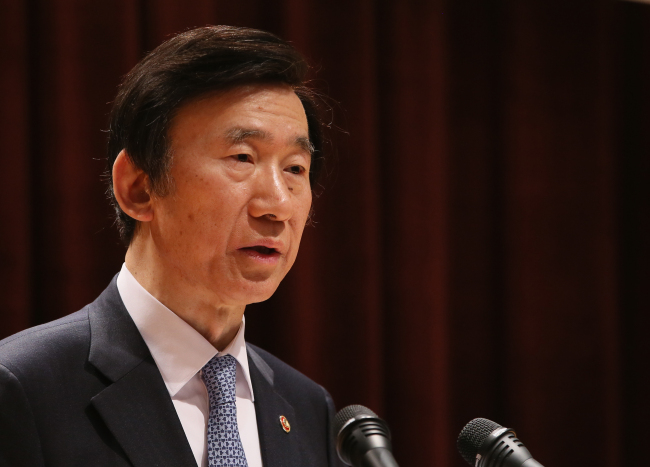Foreign Minister Yun Byung-se on Monday warned of deteriorated relations with China this year as the two nations face tensions over the planned stationing of advanced U.S. missile defense assets and Beijing’s support of peace treaty discussions with North Korea.
In his opening speech at an annual meeting of chiefs of overseas diplomatic missions, however, he offered an upbeat outlook for an unprecedented gathering with the U.S. and China “in the near future.”
Despite concerns over a raft of potential fault lines with Beijing, Yun displayed confidence in the trust between the two nations, saying the robust bilateral ties helped induce recent U.N. sanctions on Pyongyang over its latest nuclear and missile tests.
“Of course, the South Korea-China relationship may face difficulties due to certain issues or geopolitical factors,” the top diplomat said.
 |
Foreign Minister Yun Byung-se delivers his opening address during an annual meeting of chiefs of overseas diplomatic missions at the ministry`s headquarters in Seoul on Monday. (Yonhap) |
Though he did not elaborate, Yun’s remarks apparently reflected the souring mood between the two neighbors in the face of Beijing’s unfaltering opposition to the envisioned deployment of a Terminal High Altitude Area Defense battery here. Another source of contention has emerged after Chinese Foreign Minister Wang Yi called for initiating peace treaty talks with Pyongyang in tandem with denuclearization negotiations during his visit to Washington late last month.
The South has brushed off the dual-track approach as it focuses on sanctions and pressure as a fresh priority in its inter-Korean policy. Thus, concerns are growing that if Washington and Beijing manage to move forward with the plan, Seoul may be sidelined in both discussions.
“What’s important, however, is that we should constantly advance the relationship so that it does not waver in the face of certain issues and becomes a strategic asset for us to open a new future on the Korean Peninsula,” Yun said.
Citing Wang’s recent mention of the possibility for a three-, four- or five-way dialogue within the six-party disarmament talks, Yun touted tri-diplomacy as an “innovative” diplomatic technique.
“Given the dynamics in the Northeast Asia region, trilateral diplomacy can be a very useful tool depending on the issues,” he said.
“While further revitalizing the existing South Korea-U.S.-Japan and South Korea-Japan-China cooperative schemes, I expect that a trilateral meeting with the U.S. and China will be set out in the near future.”
With the Park Geun-hye administration hardening its line against Pyongyang, the minister instructed the ambassadors and consuls general to “devote all your energies” to rally support from around the world, with the resolution of the nuclear issue being a top priority.
But his address was attacked by critics for concentrating on naming what he believed were his feats --- which for others could be blunders --- such as a now shaky Seoul-Beijing relationship, a much-decried settlement with Japan on the wartime sex slavery issue and other issues that he called “nearly impossible to resolve.”
While acknowledging a series of possible sources of setbacks for South Korea’s diplomacy surrounding the peninsula and the broader region, he withheld, or failed to provide a comprehensive vision, action plans and detailed instructions. The minister has often been placed in the hot seat during his tenure since 2013 for self-praising diplomatic achievements.
He also took credit for the latest U.N. Security Council resolution saying the government defied “widespread skepticism” and succeeded in eliciting a resolution that “far exceeded previous expectations.” South Korea is not a member of the body.
“Now there is a formation that puts North Korea, a habitual breaker of international norms, against the international community including China and Russia,” Yun said.
“Behind our ability to well manage the challenges and sometimes turn them into opportunities is the trust the Park administration has built with neighbors since its inception.”
Such remarks lack a recognition of realities, critics say, expressing regret that Yun simply repeated the president’s message rather than provoking brainstorming.
“As the opening speech is open to the public, there should be some limits as to what he could tell to the colleague diplomats,” a diplomatic source said, requesting anonymity due to the sensitivity of the issue.
“But at the same time, it could offer a glimpse into our policy not only for South Koreans but also for the world, it would’ve been better if the minister took a down-to-earth approach and talked about our practical way forward.”
The conference, where some 170 ambassadors and consuls general are participating, is set to run through Friday. They are slated to visit the Demilitarized Zone on Tuesday and have in-depth discussions on four topics -- the North Korean nuclear issue and diplomacy for peninsula peace and unification; support for economic revitalization; protection of overseas residents; and public diplomacy with the participation of people.
Park, for her part, invited the diplomats for dinner later in the day, to share their views on the current security situation on the peninsula and encourage them for their “bridging role to the world,” Cheong Wa Dae spokesperson Jeong Yeon-kuk said.
By Shin Hyon-hee (
heeshin@heraldcorp.com)








